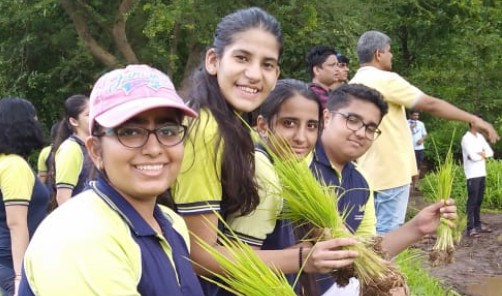While school admissions for smaller kids are the most stressful time for parents, it’s another challenge when they are looking for a school for older kids. Parents have to keep the choices of their kids in mind. The final years of school education can play a pivotal role in a kid’s career. At this age, most of the kids are sure about their career & subjects. Their choices are generally influenced by peer pressure, their interests in subjects and the wishes of their parents.
Keeping these factors in mind, we have put forward this blog as an information piece of the International Bacculerate Diploma Programme for 11th & 12 standard students.

IBDP Programme Overview at MBIS
A flagship institution of the Rajasthani Sammelan Education Trust (RSET) Mainadevi Bajaj International School (MBIS), is a co-educational international day school affiliated with the Cambridge International Examinations, UK (CAIE) and the International Baccalaureate Organization (IBO), Geneva.
The Boutique International School Difference
MBIS is a boutique international school that takes education beyond the classroom and focuses on inquiry-based experiential learning. The school’s ethos is guided by its core values that place every child at the heart of the learning experience, with individual attention and an open door policy. No wonder the happiness quotient of the children is very high. MBIS has completed a decade in offering excellent international education and its students have left their mark on several institutions of higher learning.

IBDP Curriculum
The IB Diploma curriculum model places the student in the centre of the entire course. Everything is planned for keeping the learner in mind. This student-centric approach enables the holistic development of all learners.
Further, a key part of the program is enabling students to develop the skill of how to learn (approaches to learning). Students take responsibility for their learning and understand how knowledge itself is constructed.
The curriculum also encourages students to consider both local and global contexts and enables them to develop a range of 21st-century skill sets of creativity, collaboration and critical thinking thus making them future-ready.
The IB focus on experiential learning and life skills is manifested through the CAS – Creativity, Activity and Service Program where students can develop new skills, undertake new challenges, show initiative and plan tasks and consider ethical implications of their actions. CAS programs have the power to truly transform a student and develop them into internationally minded learners.
The IB Diploma develops in students strong academic, social and emotional characteristics. IB students are also more likely to perform better academically – compared to students who have done other high school programmes.
The program also allows students to select subjects from different disciplines – languages, humanities, sciences, arts and math. The program thus does not compartmentalise learning into ‘streams’ but allows students to pursue an interdisciplinary course of study.
Overall students through participation in the 2 year IB Diploma program, become more confident in their ability to engage with people in an increasingly globalised and rapidly changing world and develop lifelong learning skills.
The IB Diploma Program requires students to select a total of 6 subjects – 3 at a higher level and 3 at Standard Level for study over the 2 years. The higher level subjects are ones that a student plans to major in when they move to university and thus it exposes them to content that is well beyond what other high school programs have to offer. This advanced content allows students to make a successful transition into university. In fact, for this reason, several overseas universities award course credits to students who secure high grades in their IB Higher Level subjects in the final exams.

Further, the IB Diploma program also requires students to work on a range of internal assessments such as Economics Commentaries (where they analyse newspaper articles from the context of the theories they have learnt in the class), Business Project (where students work with a real company), Science Investigation (where students design and plan an investigation all by themselves) to name a few. These skills help students apply their knowledge in practical scenarios which is also a pre-requisite for university courses / further study.
| IBDP Subjects for Grades 11th & 12th | ||
| English-HL/SL | Hindi B-HL/SL | French Ab initio-SL |
| Economics-HL/SL | Business Management-HL/SL | Psychology-HL/SL |
| Environmental Studies-SL | Mathematics-HL/SL | Mathematical Studies-SL |
| Physics-HL/SL | Chemistry-HL/SL | Biology-HL/SL |
| Visual Arts-SL | TOK+EE+CAS | Library |
| Physical Education | Music | Dance |
| PSTP-Football | PSTP-Basketball | PSTP-Table Tennis |
Documents Required for Admission
The following documents are required to be submitted along with the printout of the form:
- Birth Certificate (Original & a photocopy)
- Proof of nationality of child and parents
- Three passport size photographs of the student
- Previous School Leaving Certificate / Transfer Certificate (Original)
- In the case of foreign nationals, passport, copy of the parent and child with VALID VISA for a stay in India
Scholarships and Loyalty Programmes
Scholarship for Grade 11th and 12th (IBDP Programme)
- Merit Scholarship for IBDP students who get 90% or above would be given a scholarship of 1,50,000/- per year (Grade 11 & 12)
- Merit Scholarship for IBDP students who get 80% or above would be given a scholarship of 1,00,000/- per year (Grade 11 & 12)
- Under MBIS Loyalty Programme, Fees will be Rs. 9,25,000/- (if the entire amount is paid in advance)
Admission Process
- Fill the Enquiry form on the website
- Visit for a meeting with the Admissions Officer
- Fill the Admission Application Form either through the school website or at the school
- Interactive session with the School’s Senior Leadership Team
- Confirmation of admission
- Submission of documents and payment of fees



